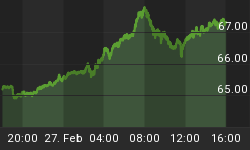The house organ for the Council of Foreign Relations, Foreign Affairs, has published its final solution under the title: "Print Less and Transfer More: Why Central Banks Should Give Money directly to the People." Written under the names Mark Blyth and Eric Lonergan, but trumpeting the establishment voice of, say, Martin Wolf, they state: "It's well past time, then, for U.S. policymakers - as well as their counterparts in other developed countries - to consider a version of Friedman's helicopter drops.... Many in the private sector don't want to take out any more loans; they believe their debt levels are already too high. That's especially bad news for central bankers: when households and businesses refuse to rapidly increase their borrowing, monetary policy can't do much to increase their spending.... Governments must do better. Rather than trying to spur private-sector spending through asset purchases or interest-rate changes, central banks, such as the Fed, should hand consumers cash directly.... The transfers wouldn't cause damaging inflation, and few doubt that they would work. The only real question is why no government has tried them."
This is a fairly standard view among celebrity economists these days, possibly worth commemorating since the CFR has joined the deluge, although, there are adult members of the CFR who should denounce this position. Money printing by Bernanke and kin has been ad hoc from the beginning, as the ecstatic and clairvoyant Bürgermeisteramt made clear when ZIRP besotted the world (see: "Meet Your Investment Manager").
That "few doubt [handing out money] would work" is true within academia and has-been institutions. History has recorded the contrary. Chase van der Roehr, writing in the August 19, 2014, edition of Bloomberg Briefs, noted "it now takes $37,403 added to the Fed's balance sheet to stimulate the creation of a new job. That number stood at $7,600 in August 2008 and has deteriorated steadily ever since."
The median new job pays much less, so the $37,403-to-1 ratio, after being adjusted for a constant quality, is infinite. "[F]ew doubt that they would work" since those polled are entirely ignorant of all but each others' opinions.
Printing money has never worked, the grander the scale the worse the calamity. The French state in 1790 was falling deeper into debt. The Assembly first confiscated Church property, found itself deeper in debt, authorized a 400 million assignat print, with a pledge that no more currency would be issued. The poor grew poorer, starved, and cries of "We need more money!" elicited another 800 million assignats. This ended in collapse, including the redemptive pleasure of Assemblymen rolled on tumbrels through the streets of Paris to their end.
Germany in the early 1920s suffered central banker Rudolf Haverstein's delusion. As jobs disappeared along with food, Haverstein worked the presses to death. (Ludwig von Mises recalled hearing "the heavy drone of the Austrian Bank's printing presses which were running incessantly day and night to produce new bank notes in Vienna." Austria was following Germany's lead; a temptation it still suffered from in the 1930s.)
The historian Alan Bullock wrote: "[The inflation] had the effect, which is the unique quality of economic catastrophe, of reaching down and touching every single member of the community in a way in which no political event can. The savings of the middle classes and working classes were wiped out at a single blow with a ruthlessness which no revolution could ever equal..."
Today, Japan's fascinating yen-printing campaign imitates the same blue print. It is ending with the people unable to pay for food; or much else; Nissan, Toyota, and Honda moving to Mexico; so eliciting hysterical government responses. Bloomberg reporter Katsuyo Kuwako captured the moment in "Japanese Women Armed with Chainsaws Head to the Hills under Abe's Plan." Kuwako reported Comrade "Junko Otsuka quit her job in Tokyo and headed for the woods, swapping a computer for a bush cutter and her air-conditioned office for the side of a mountain. She was part of a new wave of women taking forestry jobs, the result of economic, social and environmental policies sprouting in Prime Minister Shinzo Abe's Japan. Otsuka... said she's fine with the 20 percent pay cut to be the first female logger at Tokyo Chainsaws.... [Abe] set a goal of... revitalizing regional economies and enhancing women's roles."

Adam Posen -
Heavyweight Inflationist
Japanese economic policy is dictated from the United States. Maybe it should not be a surprise to read Junko's elation at a 20% pay cut to "[enhance] women's roles." After all, somehow the Conference Board was able to report U.S. consumer confidence is at a seven-year-high on August 26, 2014. Adam Posen, quad-author along with Ben S. Bernanke of Inflation Targeting: Lessons from the International Experience, is truly a man of the moment as money experiments go extraterrestrial. Posen was quoted in "We Are All Lab Rats Now" featured in "May 2014: Crematorium" (earlier visage and caption thrown in for free). Lord Circumference harassed Financial Times readers in March with his Trotskyite reforms in Japan: "Increasing female labour force participation is the right priority for structural reform. At least three million women who could work are neither in employment nor looking for a job. A few million more are squandering their capabilities in limited roles...."

Comrade Lara - Not so fine with Lenin's 20 percent cut.
Repeating the conclusion of "Meet Your Investment Manager," this crowd has so bungled every decision the possibility rises that a run-for-the-exits will be halted by markets being closed. If so, that would be trial-and-error too, as we saw in 2008. It is important to develop a strategy that can respond as circumstances change to preserve assets.
Frederick Sheehan writes a blog at www.aucontrarian.com
















